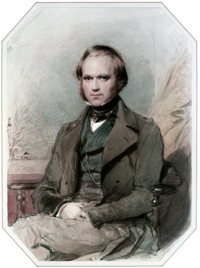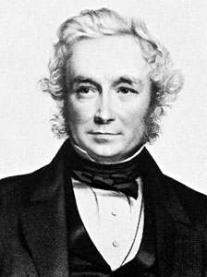
Charles Darwin was never good at maths. If he had been, we might never have heard of him. Or, perhaps, we would have a different kind of biology.
It was not that Darwin had any fundamental aversion to mathematical physics. Recalling his boyhood, he wrote: "I was taught Euclid by a private tutor, and I distinctly remember the intense satisfaction which the clear geometrical proofs gave me. I remember, with equal distinctness, the delight which my uncle gave me by explaining the principle of the vernier of a barometer." But this was only one interest among many, and his attraction to natural history (and associated outdoor sport) outweighed every other. His autobiography continues:
"After having spent two sessions in Edinburgh [as a medical student], my father perceived, or he heard from my sisters, that I did not like the thought of being a physician, so he proposed that I should become a clergyman. He was very properly vehement against my turning into an idle sporting man, which then seemed my probable destination. I asked for some time to consider, as from what little I had heard or thought on the subject I had scruples about declaring my belief in all the dogmas of the Church of England; though otherwise I liked the thought of being a country clergyman. Accordingly I read with care 'Pearson on the Creed,' and a few other books on divinity; and as I did not then in the least doubt the strict and literal truth of every word in the Bible, I soon persuaded myself that our Creed must be fully accepted."
In 1828, after a crash-course in remedial Greek, Darwin entered Christ's College Cambridge. An honours degree would require passing the Mathematical Tripos. Success in this formidable problem-set -- becoming a "wrangler" -- would be a giant first step toward entry into the mathematico-religious elite which dominated the Anglican Church. But:
"I attempted mathematics, and even went during the summer of 1828 with a private tutor (a very dull man) to Barmouth, but I got on very slowly. The work was repugnant to me, chiefly from my not being able to see any meaning in the early steps in algebra. This impatience was very foolish, and in after years I have deeply regretted that I did not proceed far enough at least to understand something of the great leading principles of mathematics, for men thus endowed seem to have an extra sense. But I do not believe that I should ever have succeeded beyond a very low grade ... "
(Who was the "very dull man"? George Ash Butterton. He left Cambridge at about the same time that Darwin set sail on the Beagle, and began a long career as a headmaster, eventually leading Giggleswick. His obituary appears in Volume 17 of The Eagle, the magazine of St. John's College Cambridge (1893).)
In a letter to fellow-student C. T. Whitley (a future clergyman-mathematician and the First Wrangler of his year), Darwin wrote from Barmouth: "I am idle as idle as can be: one of the causes you have hit on, viz irresolution the other is being made fully aware that my noddle is not capacious enough to retain or comprehend Mathematics... Beettle hunting & such things I grieve to say, is my proper sphere and this is so much the worse, as I am entirely aware how splendid & at the same time useful a study it is... [J. M.] Herbert [future seventh wrangler and one of Darwin's Barmouth companions, who went on to become a judge in South Wales] is a fine example of the good effects of Mathematical studies, & even practically I am often surprised to see how frequently they come into play.. "
Francis Darwin would later write: "My father's letters to [W. D.] Fox [his close friend and second cousin] show how sorely oppressed he must have felt by the reading for an examination. His despair over mathematics must have been profound when he expresses a hope that Fox's silence is due to 'your being ten fathoms deep in the Mathematics; and if you are, God help you, for so am I, only with this difference, I stick fast in the mud at the bottom, and there I shall remain.' Mr. Herbert says: 'He had, I imagine, no natural turn for mathematics, and he gave up his mathematical reading before he had mastered the first part of algebra, having had a special quarrel with Surds and the Binomial Theorem.'" [Charles Darwin: His Life Told in an Autobiographical Chapter, London: Murray, 1892, Vol. One, p. 108.]
To be sure, there was also a (slightly less-prestigious) Classical Tripos --- in 1827 the "very dull" Butterton had had the unusual distinction of being third Classical as well as eighth Mathematical wrangler --- but it, too, presupposed skill in mathematics, and in any case Darwin showed little aptitude (by the standards of the time) for Greek. He had no choice but to settle for an "ordinary" degree, the kind popular with lower-ranking clergy.
There was, of course, nothing bad or unrespectable about this. The pleasant life of a country parson would have provided Darwin not only with income and endless opportunities for hunting and riding, but also with the chance to pursue his serious interest in natural history; this was, in effect, the life story of his friend W. D. Fox. Moreover, while many bishops had been wranglers, few wranglers attained the episcopate; most ended up living much like their brethren with ordinary degrees.
Even this path to a living, however, required some effort, and Darwin seems to have been completely unmotivated until his talent, hidden from most, was recognised by the Rev. John Stevens Henslow, Professor of Botany (and 16th Wrangler in the 1818 Mathematical Tripos), who began grooming him for the career of a clergyman-naturalist. Henslow's intellectual influence on Darwin's science was to be enormous and life-long, and the immediate impact of his example and friendship was dramatic.

Darwin wrote: "I have not as yet mentioned a circumstance which influenced my whole career more than any other. This was my friendship with Professor Henslow ... His strongest taste was to draw conclusions from long-continued minute observations ... His moral qualities were in every way admirable. He was free from every tinge of vanity or other petty feeling; and I never saw a man who thought so little about himself or his own concerns ...
"I once saw in his company in the streets of Cambridge almost as horrid a scene as could have been witnessed during the French Revolution. Two body- snatchers had been arrested, and whilst being taken to prison had been torn from the constable by a crowd of the roughest men, who dragged them by their legs along the muddy and stony road. They were covered from head to foot with mud, and their faces were bleeding either from having been kicked or from the stones; they looked like corpses, but the crowd was so dense that I got only a few momentary glimpses of the wretched creatures. Never in my life have I seen such wrath painted on a man's face as was shown by Henslow at this horrid scene. He tried repeatedly to penetrate the mob; but it was simply impossible. He then rushed away to the mayor, telling me not to follow him, but to get more policemen. I forget the issue, except that the two men were got into the prison without being killed.
"... I cannot resist mentioning a trifling incident, which showed his kind consideration. Whilst examining some pollen-grains on a damp surface, I saw the tubes exserted, and instantly rushed off to communicate my surprising discovery to him. Now I do not suppose any other professor of botany could have helped laughing at my coming in such a hurry to make such a communication. But he agreed how interesting the phenomenon was, and explained its meaning, but made me clearly understand how well it was known; so I left him not in the least mortified, but well pleased at having discovered for myself so remarkable a fact, but determined not to be in such a hurry again to communicate my discoveries."
Under Henslow's influence, Darwin went from inattentive idler to serious student, and the life of a rural scholar-priest was open to him. There was only one real obstacle: Darwin's lack of serious religious conviction. Henslow, if he was aware of his disciple's still mild doubts at all, probably took them lightly as youthful symptoms soon to be outgrown. He himself was unswervingly devout, and, not long after Darwin graduated, left Cambridge to spend the rest of his life as a parish priest.
The new, serious Darwin finished his university career on a high note: "By answering well the examination questions in Paley, by doing Euclid well, and by not failing miserably in Classics, I gained a good place among the hoi polloi or crowd of men who do not go in for honours. Oddly enough, I cannot remember how high I stood, and my memory fluctuates between the fifth, tenth, or twelfth, name on the list." (The correct answer is "tenth".) Nonetheless, completing his degree left the young naturalist in an odd, depressed state of mind: "I do not know why the degree should make one so miserable ... & what makes it the more ridiculous, is I know not what about." [Letter to W. D. Fox, 1831 January 23]. He undertook none of the steps which would have led to ordination; instead he made a second trip to Barmouth, this time geologising in the (extremely distinguished!) company of Henslow's own tutor, the Rev. Adam Sedgwick. Geology was a late-blooming interest for Darwin the university student -- he had only begun to study it while fulfilling residency requirements after passing his final examination -- but he took to it, and to Sedgwick, at once.
Returning home to Shrewsbury, Darwin learned that Henslow had declined the position of ship's naturalist aboard H.M.S. Beagle, and had nominated his protegé to fill the place instead.

ADDITIONAL REFERENCES:
- An excellent account of Darwin's sojourn at Christ's College is Charles Darwin's Cambridge Life by John van Wyhe [Journal of Cambridge Studies 2, No. 4, 2 (2009 December)] (pdf)